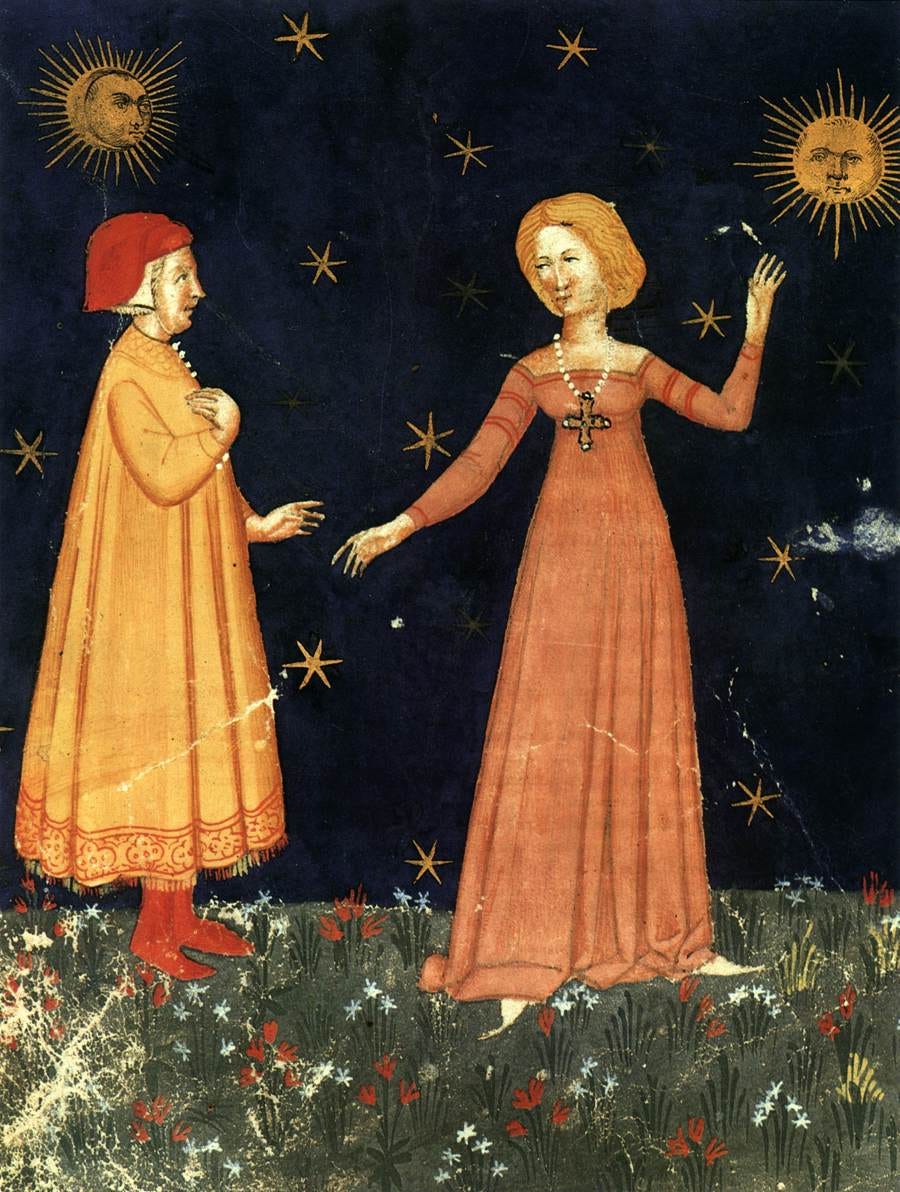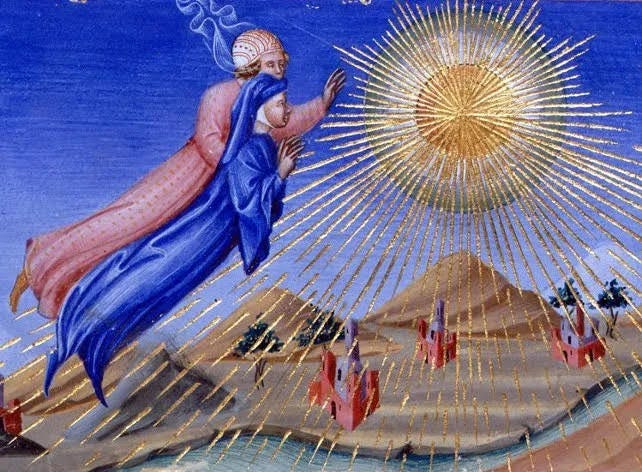The Feminine Divine has a storied history in religious texts and literature alike. Often, however, the face of the feminine divine shines through an earthly personage. In Goethe’s masterpiece Faust, the hero loses his duel with the devil. His contract with Mephistopheles requires the forfeiture of his soul, and in the drama’s closing scene, raucous devils arrive to ferry him to hell. The ending is poised to be yet another version of the morality play’s tragic conclusion as it had long played out in hundreds of versions performed in fiction and fairs across a vast cultural landscape over past centuries. But in Goethe’s Romantic version, a shocking reversal occurs: Angels intrude and pronounce Faust redeemed through the successful intercession of the soul of a young girl he had wronged—the maiden Gretchen. One of the greatest works of Western literature ends with the mantic pronouncement:
Das Ewig-Weibliche Zieht uns hinan [The Eternal-Feminine Draws us on high.]
The most enduring version of this cosmic trope—and certainly one that Goethe had in mind—was from the masterpiece of the Middle Ages: Dante’s Divine Comedy. This trilogy, one of the first great works of literature written in the vernacular (Tuscan), depicted in an accessible and memorable way the theology of the Medieval church. Through the character of the narrator, we follow the paradigmatic journey of the pilgrim making his way through earthly travail, purgation, and into heaven.
Spurring him along the entirety of his journey is his Platonic love for the idealized Beatrice, an Italian girl Dante had met briefly, but who captured Dante’s heart and served as his spiritual inspiration and poetic muse. In the epic poem, she sends Virgil the poet to guide Dante the pilgrim through Purgatory, at the summit of which she conducts him personally through ever higher and more radiant celestial spheres.
A most famous scene takes place in the final moments of his ascent. As the journey ends in the divine presence, Dante anticipates a beatific eternity in the company of Beatrice, “through [whose] power and excellence alone” he has “recognized the goodness and grace” that is the object and prompt of all his striving. In a moment, she is gone. He panics and sees Beatrice in the distance. He prays desperately to her who has “healed his soul,” seeking assurance of her abiding grace. In response,
she—far up the mountain, As it appeared to me—looked down and smiled. Then she turned back to the Eternal Fountain. (Poi si tornò all’ eterna fontana)
The church of Dante’s era was rooted in the theology of St Augustine (in process of being overtaken in influence by Aquinas). A central feature of Augustine’s theology of love was that it is always one of two kinds: love is use or love is enjoyment; it is either instrumental or it is the deserving end of all our striving. Augustine is very explicit on this point: “humankind’s proper attitude to the world is not enjoyment (frui) but use (uti).”1 And the same holds true for other persons. Only God is to be loved for himself and himself alone.
That was Beatrice’s message to Dante.
C. S. Lewis admired Dante’s work and Augustine’s thought that had inspired much of it. A great struggle came into his life when death intruded upon his so-long-delayed marriage to Joy Gersham. After only three years together, she died of cancer and he agonized over her loss. He feared that in his hopes for future reunion he was just engaging in a sentimental projection. More painfully, he considered that Augustine and Dante were right, that we err in letting our longing for family obscure our only legitimate end: God himself. He journaled about his inner conflicts of human impulse against theological commitments.
That’s what was really wrong with all those popular pictures of happy reunions ‘on the further shore’; not the simple-minded and very earthly images, but the fact that they make an End of what we can get only as a byproduct of the true End. Lord, are these your real terms? Can I meet Joy again only if I learn to love you so much that I don’t care whether I meet her or not?2
In the end, he concluded Augustine and Dante were right. In working through his grief, Lewis had at last an experience of “assurance,” of Joy’s continuing presence, precise yet “incredibly unemotional,” imbued with neither “joy nor sorrow.” The ultimate significance of the encounter was to interpret for him an experience he had had at Joy’s deathbed. On that occasion, Joy had said to the chaplain, “I am at peace with God.” Only now, it seems, in the aftermath of his visionary experience, does the import of that scene become clear to Lewis. After assuring the chaplain of her peace, he recorded, poignantly but I think tragically, “She smiled, but not at me. Poi si tornò all’ eterna fontana.” Lewis takes those final words of Dante, verbatim, with which to conclude his own pilgrimage of love. He is now ready to relinquish Joy, as Dante did Beatrice.
We come at last to a third farewell, a third scene where a lover observes the pole star of his universe fade into the beyond. The moment is depicted in Wendell Berry’s masterpiece, Jayber Crow.
Jayber (who in the novel compares himself to Dante’s pilgrim) is now an old man, and he has had one love in his life: Mattie Chatham. Like Dante’s, it was a Platonic love, an admiration so rich and pure and sanctifying that it gave coherence and beauty to everything in Jayber’s uneventful life. Mattie had perhaps sensed his devotion, in the scattered moments of conversation and comfortable silence that they innocently shared over the years in a grove of trees where they occasionally encountered one another. Now Mattie lies dying in a hospital bed, her husband has sold for logging that small paradise of trees that had become their sanctified site of friendship and love, and Jayber has come to say his goodbyes.
“Jayber. Oh, he’s cutting the woods.” And so she knew. Her eyes filled with tears, but she said quietly, “I could die in peace, I think, if the world was beautiful. To know it’s being ruined is hard.” Then, in the loss of all the world, when I might have said the words I long wanted to say, I could not say them. I saw that I was not going to be able to talk without crying, and so I cried. I said, “But what about this other thing.” She looked at me then. “Yes,” she said. She held out her hand to me. She gave me the smile that I had never seen and will not see again in this world, and it covered me with light.”
After a millennium of poetic error and theological misfires, Wendell Berry gets the ending right. God intends for all of us to be ends, and not merely means. In God’s universe, love does not compete with love. His project is only its multiplication.
Terryl Givens is Senior Research Fellow at the Maxwell Institute and author and coauthor of many books, including Wrestling the Angel, The God Who Weeps, and All Things New.
Audio produced by BYUradio.
Hannah Arendt, Love and Saint Augustine (Chicago: University of Chicago Press, 1996), 36.
C.S.Lewis, A Grief Observed (New Delhi: Adhyaya, 2021), 40.








Beautiful essay. Your conclusion might be true, but I vote to take love more 'seriously' in its particularity that allows no 'comforting' resolution in mystical oneness that eliminates competition. Universal love (utterly unconditional and non-hierarchical) which ends competition is a philosophical attempt to assure the story ends the same for all. But without 'opposition' (trade-offs) there is no existence. Love is valuable in its forced option between rivals. This is the trade-off that the gods we worship made: no disappointment, no unrequitedness, and above all no envy OR love that is particular and comparative and the MOST delicious above alternatives. Eternity without the either/or tension of hierarchical evaluation and choice is not dramatic enough to sustain our interest. So through eons of eternity, so far, love is 'the best.' As you are at writing short essays these days.
The only thing better than reading your writings Terryl is listening to you! Thank you. What a gift!